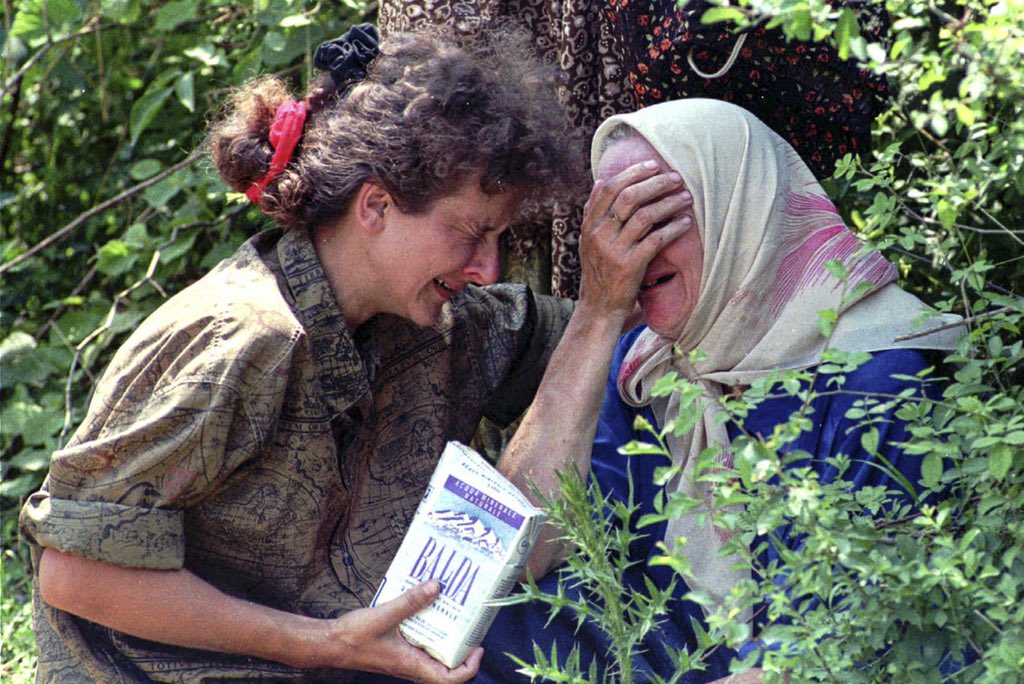The UK National Srebrenica Memorial Day Ceremony will begin shortly.
Join us in remembering the Bosnian Genocide:
srebrenica.org.uk/ceremony
Join us in remembering the Bosnian Genocide:
srebrenica.org.uk/ceremony
Today we have gathered to remember, to reflect, and to learn.
26 years ago, thousands of Bosniak-Muslims were murdered en masse due to their identity.
Today, we honour them.
Join the ceremony now: srebrenica.org.uk/ceremony
26 years ago, thousands of Bosniak-Muslims were murdered en masse due to their identity.
Today, we honour them.
Join the ceremony now: srebrenica.org.uk/ceremony
Chair of RSUK @waqarazmi opens the ceremony with important words.
"As we move forward with rebuilding our communities, we will remember and learn from the stories of genocide survivors whose spirit is remarkable."
Srebrenica.org.uk/ceremony
"As we move forward with rebuilding our communities, we will remember and learn from the stories of genocide survivors whose spirit is remarkable."
Srebrenica.org.uk/ceremony
"I miss it greatly. I guess I miss it because so many of the people I remember growing up with are no longer alive"
@suljagicemir1 (now the director of @SrebrenicaMC) talks of his experience surviving the genocide and the loss of his family due to it.
@suljagicemir1 (now the director of @SrebrenicaMC) talks of his experience surviving the genocide and the loss of his family due to it.
"Every night you'd just be happy that you even survived until the dawn because during the day between 3,000 to 4,000 grenades would fall on Potočari."
"I actually didn't "lose" anyone. My 11 year old daughter was in fact murdered." - Fikret Grabovica speaks about his life during the siege and the fear and heartbreak of a parent who lost his child.
Honour genocide survivors, join the ceremony srebrenica.org.uk/ceremony
Honour genocide survivors, join the ceremony srebrenica.org.uk/ceremony
"My brother and I never really got to have a childhood" Dževa Avdic shares a heartbreaking testimony of genocide through a child's eyes.
Honour genocide survivors, join the ceremony srebrenica.org.uk/ceremony
Honour genocide survivors, join the ceremony srebrenica.org.uk/ceremony
President Sefik Džaferovic, Bosnian member of the Presidency speaks passionately about the genocide and rebuilding lives.
"Despite the systemic hatred, which culminated in the genocide in Srebrenica, the people I belong to did not take the path of revenge."
"Despite the systemic hatred, which culminated in the genocide in Srebrenica, the people I belong to did not take the path of revenge."
Dominic Raab MP, Secretary of State, reiterates the government's support to peace and genocide education.
Join the ceremony: Srebrenica.org.uk/ceremony
Join the ceremony: Srebrenica.org.uk/ceremony
Nicola Sturgeon honours Bakira Hasečić, a victim of systematic rape enacted by Serb forces in Višegrad.
"We must never forget, Srebrenica was the final cumulation of a genocidal plan aimed at Bosnian-Muslims"
Join us in honouring the survivors:
Srebrenica.org.uk/ceremony
"We must never forget, Srebrenica was the final cumulation of a genocidal plan aimed at Bosnian-Muslims"
Join us in honouring the survivors:
Srebrenica.org.uk/ceremony
First Minister of Wales honour survivor Dzemal Hodzic and all the survivors of the Siege of Sarajevo, paying respects as well to the destroyed cultural aspects such as the beautiful Sarajevo library.
Join now: srebrenica.org.uk/ceremony
Join now: srebrenica.org.uk/ceremony
British-Bosnians such as Ferid lost everything in the genocide and ethnic cleansing. Today we are honouring their strength, resilience, and perseverance in rebuilding their lives in the UK.
Join the ceremony: srebrenica.org.uk/ceremony
Join the ceremony: srebrenica.org.uk/ceremony
Smajo Bešo speaks powerfully about his mother's lessons on hatred and how her instance of empathy allowed him to heal after his aunt Emina was killed by Croat forces.
"The biggest lesson on what happened in Bosnia is that we cannot be complacent"
"The biggest lesson on what happened in Bosnia is that we cannot be complacent"
Despite all the forensic and evidence, genocide denialism continues to be prevalent. Survivors say:
"Trust and justice are integral to peace"
"Trust and justice are integral to peace"
"It's very important to us that future generations know what kind of evil happened here....and for it to never happen again"- Fikret Grabovica
srebrenica.org.uk/ceremony
srebrenica.org.uk/ceremony

Haunting segment of survivor testimonies as spoken by Bosnia's celebrated actors, including Izudin Bajrović. Emotional and important that we never forget the length of the horrors genocide survivors experienced.
#BosnianGenocide
Srebrenica.org.uk/ceremony
#BosnianGenocide
Srebrenica.org.uk/ceremony
In honour of those we lost who we can never get back due to hatred and all the genocide survivors who bravely speak out, Remembering Srebrenica's 11 boards light a candle in a moment of remembrance and reflection.
We remember. We vow to never forget.
We remember. We vow to never forget.
The ceremony closes with @lordnickbourne who ends the event with words of hope and reflects on the inspiring strength and hopefulness of genocide survivors in spite of the hatred they experienced.
Thank you to all across the UK who joined us this evening in an act of remembrance. By taking this small action you have ensured we do not forget the pain of the Bosnian genocide survivors. You have taken a step towards a better future.
Together, we remember.
Together, we remember.
If you have missed this evening's event, the ceremony will be left on our site srebrenica.org.uk/ceremony as well as on our YouTube.
In addition, in the coming days and weeks we will be releasing the full testimonies of the brave survivors from this evening's ceremony.
In addition, in the coming days and weeks we will be releasing the full testimonies of the brave survivors from this evening's ceremony.
• • •
Missing some Tweet in this thread? You can try to
force a refresh

















